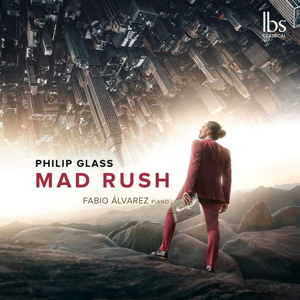
Philip Glass (b. 1937)
Mad Rush (1981)
Études Nos 2, 5, 6 & 9 (1991-2002)
Wichita Vortex Sutra (1988)
Trilogy Sonata (2000)
Knee Play No. 5 from Einstein on the Beach (reworked F. Álvarez for narrator & piano, 2019)
Fabio Álvarez (piano)
rec. 2022, Auditorio Manuel de Falla, Granada, Spain
IBS CLASSICAL IBS92022 [69]
Since discovering Vikingur Ólafsson’s extraordinary Glass recital a year or so ago (review), I have been on a journey seeking out other piano recitals of this music, especially those including some of the Études. Among those I have found was one by Kristina Socanski (review) where I mentioned the impending release of this recital by Spanish-born New York-trained pianist Fabio Álvarez, which on the basis of some short samples sounded promising.
I can now provide a full review of what is indeed a very fine collection, including a work, the Trilogy Sonata, which was new to me. In the booklet notes, the importance of New York to Philip Glass and his music is emphasised, and by extension, also to Álvarez because of his time spent at the Manhattan School of Music.
Mad Rush was written for the visit of the Dalai Lama to New York in 1981, and Álvarez imparts it with a sadness and poignancy, even in the loudest moments. While I wasn’t entirely sure why this should be, I did find it interesting and quite effective. The four Études are where he comes directly up against Ólafsson, and it will hardly be a surprise to anyone reading the first sentence in this review that Álvarez doesn’t reach the same heights. Through a combination of pedal, touch, dynamics and most importantly imagination, Ólafsson turns these studies into minor miracles. He is able to take the repetitions and add subtle differences to them, so that they gain layers of depth. No one else has got close to him, so Fabio Álvarez is in plenty of company.
Wichita Vortex Sutra was written to accompany a reading of a poem about the Vietnam War by Allan Ginsberg, and here Álvarez does achieve some of the depth and especially richness of sound that I associate with Ólafsson (who hasn’t recorded this piece). Slower than Socanski, Álvarez wins out in the intensity of his playing. The Trilogy Sonata comprises three movements, arranged by the composer from his portrait operas, Einstein on the Beach, Akhnaten and Satyagraha. I enjoyed it greatly. Álvarez handles the different tempos and feelings across the twenty minutes well.
The standalone Knee Play (Glass’s term for the sections that act as joints between the scenes in the operas) reworked by Álvarez himself is the only disappointment on the album. Firstly, the balance between piano and voice (Álvarez himself) is not good so that neither is properly heard, and secondly, I don’t understand where the lyrics come from. I watched a performance of this section of the opera on YouTube, and the spoken words were totally different. There is no explanation of this or attribution of the source of the lyrics in the booklet, so the listener is left totally in the dark, and in my case, rather let down. It would have far better had Álvarez simply transcribed the piece for piano (as Glass himself did for No. 4 as the first movement in the Trilogy Sonata).
The recording engineer has done Álvarez proud – the Steinway sounds glorious, indeed matching the sound in the Ólafsson recital. The notes, contributed by Álvarez, are satisfactory with the one big flaw already mentioned.
For fans of the piano music of Philip Glass, this is a recording you should hear. Yes, it inhabits a space overshadowed by the Ólafsson recital, but of those in that space, it is one of the best (especially if one ignores the last piece).
David Barker
Help us financially by purchasing from




















